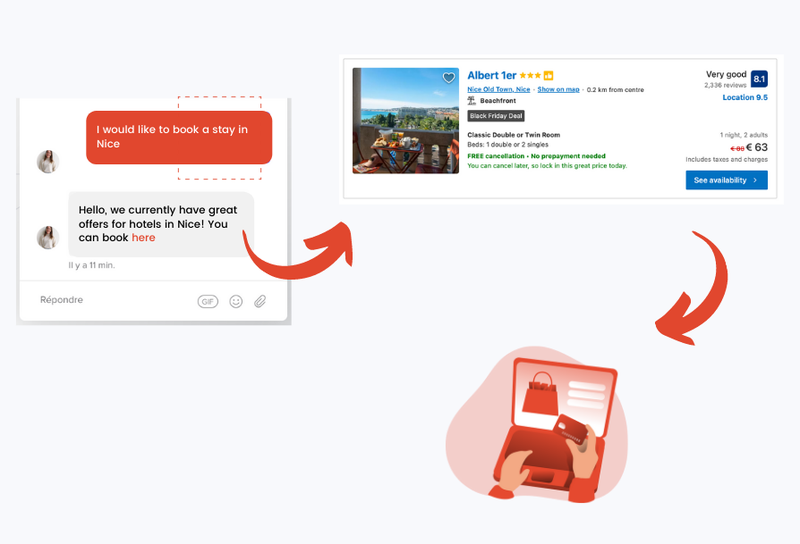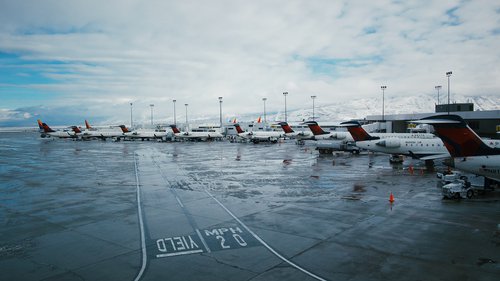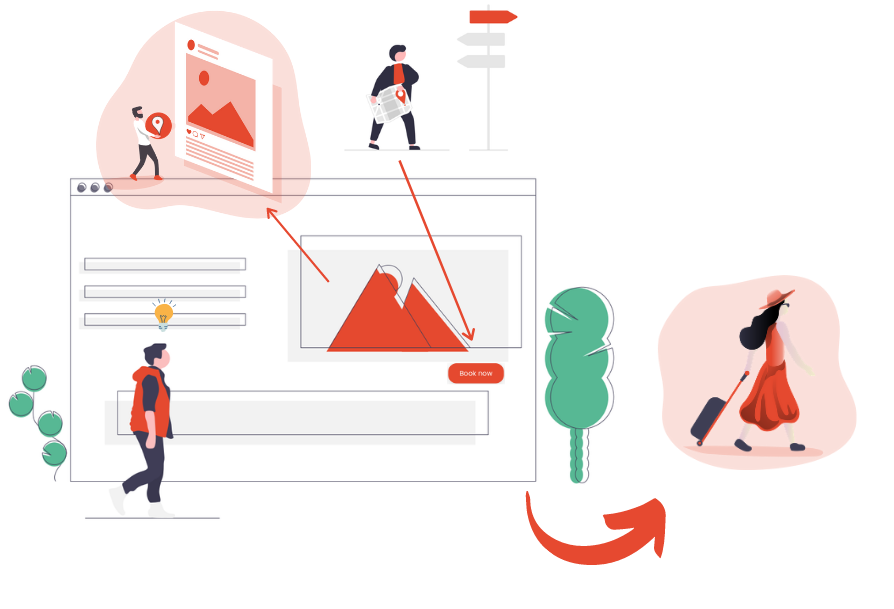Artificial intelligence for travel and tourism: applications, use cases and technologies
Artificial Intelligence and Deep Learning in the Tourism Industry
Nov. 29, 2021

Over the years, the influence of artificial intelligence (AI) has spread to nearly every aspect of the travel and hospitality industry. 30% of hospitality companies are using AI to improve their sales processes, websites and product personalization
The proliferation of AI in the travel and hospitality industry can be attributed to the enormous amount of data generated today. AI can analyze data from obvious sources, add value by assimilating patterns of images, voice, video, and text, and transform them into meaningful, actionable information for decision making. Trends, outliers and patterns are determined using machine learning based algorithms that help guide a travel or hospitality company to make informed decisions.
Discounts, programs, packages, seasons and travelers to target are formulated using this intelligent data combined with behavioral science and social media attribution to learn about customer behavior and insights. Moreover, an increasing number of companies are now proving direct access to their technology and data through travel APIs which make the development of new applications and services much easier
Let's take a closer look at the areas of application of AI in the travel and hospitality industry and the impact on the business value chain that results:
Tailored and bespoke experiences

There are always a few pioneers who are ready to take on a new challenge and embrace exponential new age technologies. Many hotel chains have started using an AI powered bot. Connie from Hilton Worldwide, the first true AI-powered concierge robot, is a good example. Connie stands two feet tall and guests can interact with him as they check in. Connie is powered by IBM's Watson AI and uses the Way Blazer travel database. It can provide customers with succinct information about local attractions, places to visit, etc. Since the AI is driven by a self-learning capability, it can learn and adapt and respond to each guest in a personalized manner.
In the travel space, Mezi, which uses AI with natural language processing technology, provides a personalized experience for business travelers, who are usually short on time. The idea is to introduce a "bleisure" (business+leisure) concept to meet the needs of the workforce. The company's research shows that 84% of business travelers return frustrated, exhausted and unmotivated. The type of tedious and monotonous planning that goes into booking the trip could be the reason. With AI and NLP, Mezi gathers individual preferences and generates personalized suggestions to provide a tailored, streamlined experience and properly address any issues encountered.
Intelligent travel search

Increasing productivity now starts with hotel search, and the use of sophisticated AI has given the customer access to more data than ever before. Booking sites like Lola.com provide on-demand travel services and have developed algorithms that can not only instantly connect people to their team of travel agents who find and book flights, hotels, and cars, but have also been able to equip their agents with amazing technology to help with research and decisions.
Intelligent travel assistants

Chatbot technology is another important part of AI, and it's no surprise that many travel brands have already launched their own versions in the last year or so. Skyscanner is just one example, creating a smart bot to help consumers find flights in Facebook Messenger. Users can also use it to request travel recommendations and unplanned suggestions. Unlike e-commerce or retail brands that use chatbots, which can seem gimmicky, it's fair to say that examples like Skyscanner are much more relevant and useful to everyday consumers. After all, with the advent of so many other travel search sites, consumers are overwhelmed with choice - not necessarily helped by it. Therefore, a chatbot like Skyscanner is able to cut through the noise, connecting with consumers at their own pace and in the social media spaces they frequent most often.
Recently, Aero Mexico started using the Facebook Messenger chatbot to answer very general questions from customers. The main idea was to answer 80% of the questions, which are usually repetitive and on common topics. Thus, AI is of great help in avoiding a repetitive process. Airlines are benefiting tremendously from this. KLM Royal Dutch Airlines uses AI to answer customer questions on Twitter and Facebook. It uses an algorithm from a company called Digital Genius, that has learned from over 50,000 questions and answers. In addition, Deutsche Lufthansa's Mildred bot can help search for the lowest fares.
Smart recommendations

International hotel search engine Trivago has acquired Tripl, a Hamburg, Germany-based machine learning startup that builds its product with recommendation and personalization technology, allowing it to take a customer-centric approach. The artificial intelligence algorithm provides tailored travel recommendations by identifying trends in users' social media activities and comparing them to internal data from users with similar interests. When it launched, users could sign up only on Facebook and share a lot of information about their profile, such as friends, relationship status, hometown and birthdays.
Person-based travel recommendations, the use of images and personalized text are now gaining traction to drive travel. KePSLA's travel recommendation platform is one of the first in the world to do so using deep learning and NLP solutions. With 81% of people believing that smart machines would be better at processing data than humans, there is also a level of trust in this area from consumers.
Know your traveler

Dorchester Collection is another hotel chain that uses AI. However, instead of using it to provide a front-end service, it has embraced it to interpret and analyze customer behavior in-depth as raw data. In partnership with technology company Richey TX, Dorchester Collection helped develop an AI platform called Metis.
By digging into customer feedback, such as surveys and comments (which would take an inordinate amount of time to find and analyze manually), it is able to measure performance and instantly discover what really matters to customers. Dorchester using Metis found out that breakfast was not only an expectation but something that guests truly valued. As a result, hotels began thinking about how they could improve and personalize the breakfast experience.
Smart forecasting: flight and hotel rates

Flight and hotel rates are dynamic and vary in real-time, depending on the provider. No one has the time to manually track all these changes. That's why smart algorithms that monitor and send timely alerts on the most attractive deals are currently in high demand in the travel industry.
Trivago and Make my trip sift through a multitude of data points, variables, and supply and demand models to recommend optimized travel and hotel prices. AltexSoft's scientific team designed a similarly innovative fare prediction tool for one of its clients, an international online travel agency, Fareboom.com. Working on its core product, a digital travel booking website, they were able to access and collect historical data on millions of fare searches going back several years. Mining this dataset, they were able to create a self-learning algorithm, capable of forecasting future price movements based on a number of factors, such as seasonal trends, demand growth, airline specials, and deals.
Optimized disruption management: delays and cancellations

The previous case is primarily focused on planning trips and helping users solve the most common travel problems. Automated disruption management is somewhat different. It aims to solve real-world problems that a traveler might encounter while traveling to a destination point. Primarily applied to business and professional travel, disruption management is always an urgent task, requiring an immediate response.
While the chances of being hit by a storm or volcanic eruption are very low, the risk of travel disruption is still quite high: there are thousands of delays and several hundred canceled flights every day. With recent advances in AI, it has become possible to predict such disruptions and effectively mitigate losses for both the traveler and the carrier. The 4-site tool, built by Cornerstone Information Systems, aims to improve business travel efficiency.
The product is aimed at travelers, travel management companies, and corporate clients, providing a unique set of features for managing travel disruptions in real-time. For example, if there is heavy snowfall at your destination and all flights are rerouted to another airport, an intelligent assistant can check available hotels locally or book a transfer from your actual arrival location to your original destination.
Not only are passengers affected by travel disruptions, but airlines incur significant losses every time a flight is canceled or delayed. As such, Amadeus, one of the world's leading Global Distribution Systems (GDS), has implemented a schedule recovery system, aimed at helping airlines mitigate the risk of travel disruption. This tool helps airlines instantly and effectively address any threats or disruptions to their operations.
Future opportunities for the travel and tourism industry thanks to artificial intelligence
Considering the aforementioned use cases from the travel and hospitality industry that are widely using AI, there will be few latent potential areas in the industry that will adopt AI in the future:
There is no doubt that we will see many travel and hospitality organizations using AI for intelligent recommendations and launching their own chatbots. It's already been suggested that Expedia is next on the list, but it appears to be focusing on business travel rather than vacationers. We can also expect to see change on the visual marketing side with new AI models being able to modify picture instantly. For exemple, real estate agents have been using it to do virtual home staging of interiors and we can really see this concept apply for hotels.
With a greater need for structure and less desire for discovery, it certainly makes sense that AI would be more suited to business travelers. Specifically, it could help simplify the booking process for businesses and eliminate discrepancies in employee spending. By reducing costs and improving efficiency, two of the main benefits, AI could begin to infiltrate business travel even more than leisure over the next 12 months.
Finally, we can expect to see more conversational AI development in the industry. With voice search, searching and booking travel could become faster and easier than ever. Similarly, as Amazon Echo and Google Home become more commonplace, more hotels could begin experimenting with voice recognition to improve customer service. This means that devices and bots could become the norm for brands in the travel and hospitality industry.
The transformation of the travel and hospitality industry will shift to one that is experience-driven and asset-based, and the widespread adoption of AI will usher in a new customer experience and set the motives for other industries to get on board.
Fasten your seatbelts... AI will reshape the travel and hospitality industry 🚀
Let's talk about your projects

Register for a call
We'll take up to one hour to discuss about your needs and find the solution that suits you the most
About Hatlas Vision
We use Artificial Intelligence to curate, categorize and monetize travel content.
Our services range from smart affiliate web plugins and widgets to custom travel NLP and computer vision in order to help you monetize your travel blogs and websites
Categories
Recent Posts
- Capture Leads and and Engage Customers with an Innovative Travel Planning Widget on your Website (powered by ChatGPT 4)
- The Best Travel APIs for Affiliate Marketing: Tours, Hotels, Food, Flights
- The Complete Guide to Become a Travel Blogger in 2022
- How travel brands can use UGC to improve their visual marketing strategy
- On-page SEO analysis for Travel Websites using Artificial Intelligence